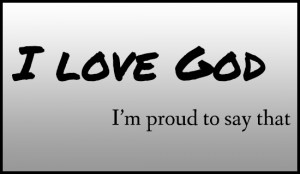Love God in 2014
 As 2013 comes to a close and 2014 approaches, a good thing UBF emphasizes is to write a review of the previous year and to choose a key verse for the New Year. This post is not my key verse testimony (2014, a year of remembrance). But this is a thought and a prayer which is good for all Christians in the coming year: Love God with our entire being.
As 2013 comes to a close and 2014 approaches, a good thing UBF emphasizes is to write a review of the previous year and to choose a key verse for the New Year. This post is not my key verse testimony (2014, a year of remembrance). But this is a thought and a prayer which is good for all Christians in the coming year: Love God with our entire being.
Heart, soul and strength. For over three decades of having one to one Bible studies with many young adults, I have always explained the Great Command (Dt 6:5; Mt 22:37; Mk 12:30) as loving God with all our emotions (heart), all our intellect (mind), and all our effort (strength). It is to love God emotionally, intellectually and volitionally. I like this exegesis. But I am technically off.
In the original language, the Hebrew word translated “heart” refers both to emotions as well as our mind, i.e., to our inner person. “Soul”–which means “throat”–has meanings of appetite/desire, life, the whole self; “soul” refers to one’s entire person. “Strength,” meaning power, also means “greatly, exceedingly.” It is best captured by a word like “resources.” This includes physical strength, but also economic and social strength, as well as all things we own–our family, house, tools, toys, savings, even our church and ministry.
Inner being, whole person and everything we own. A more thorough rendering of the Great Command would be to love God with all of our inner being (heart), with our whole person (soul) and with everything we claim to own (strength). In brief, it means to love the only God (Dt 6:4; Mk 12:29) without reservation or qualification.
Hopefully, this is helpful as you share Jesus and Scripture with others. May God bless you and UBFriends to love God in 2014.

Good thoughts, Ben. Indeed I am not ashamed to say I love God. I am not ashamed to say I love Jesus, I love the Holy Spirit and I love the Holy Scriptures.
I would expand your heart/mind/soul thinking to include two more pieces of the human existence: conscience and identity. Maybe “identity” is “self”.
I once became a “holy butcher”, chopping up my conscience and my identity, thinking this is included in “self denial” and “taking up your cross”. But I have since learned that God never intended human beings to be masochists. There is no glory in self-mutilation (either in a physical or spiritual or mental or financial sense).
I once thought God called us to live in the grotesqueness of the cross, creating pain and punishment in order to beat out our sins. In fact however, the gospel is entirely opposite. Christ’s sacrifice was “one and done”. Hebrews study is most helpful in this regard. There is one Priest who made one sacrifice. There is one Shepherd who oversees our souls.
And we need to carry this further into “I will love people in 2014”. Loving God means nothing if I can’t love people. I love my wife. I love my kids, my mom, my dad, my family, my neighors, my enemies, my abusers. Love for God must spill over to love for humanity. Just as Jesus wept and embraced humanity in all its fullness, so we are called to be human.
Absolutely, YES!
Brian, Based on my limited understanding of heart/soul/strength in Hebrew, I think that conscience and identity would be included.
“Heart” refers to our inner self (emotion and mind), which I think should include our conscience, which we will lose if we cheat our conscience.
“Soul” refers to our entire person, which I think should include our identity.
I think that we lose an element of our heart and soul when our identity markers and our conscience are determined more by our ethnicity, denomination, tribal group, elitist tendencies, sectarian biases, propositional statements or core values, etc.
Yes I think you are correct Ben. I think we need to take a closer look at what makes up heart/soul/strength and identity some components that should not be cut out or denied because God can use those parts and we need them. Some elements of humanity need redeeming/transforming and should not be cut out in the name of self-denial.
As far as I might be proud of a religion whose primary virtue is humility, I am very proud of my religion. I am especially proud of those parts that appear to be fantasy. I am proud of being bound to ancient dogmas and enslaved by dead creeds, for I recognize that it is only heresy that is dead, and that it is only the reasonable dogma that survives long enough to be called ancient.
Hey forests, I can’t comprehend what you just wrote here… but please share it in your 1:1 study :)
The image says “I love god I am proud to say that”. I would say that many want to “just love god”. Just it is not enough to “just love him” if we have no idea who he is or how to love him, or why we ought to love him. We need religion for that. It is the error of all those that claim Christianity is not a religion just a relationship. Our love demands more.
Thanks, Forests, my favorite verse for loving God that moves me to my very core is 1 Jn 4:19. My question always is “How can God ever love me???” (Some people might even fully agree with my question…and I don’t blame them in the least!) And yet he does!